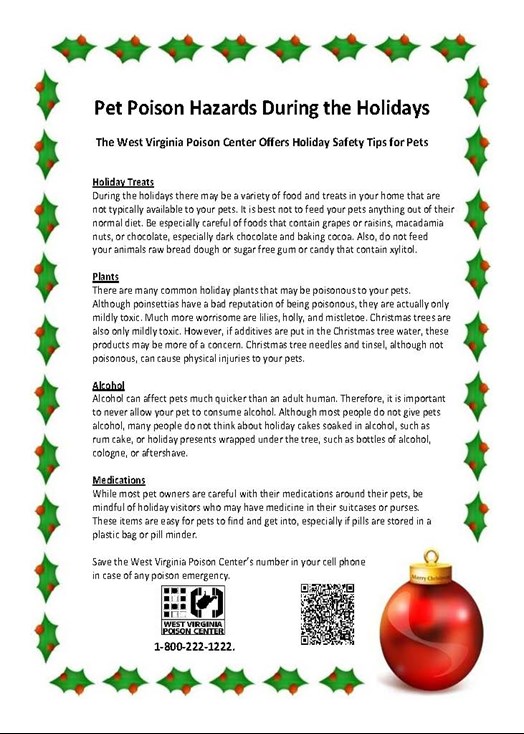Poisoning & Pets
POISONING & PETS
 Most of the calls received by the West Virginia Poison Center involves humans. Pets, however, can also be victims of poisoning. Call the poison center for help and advice if you think your pet has been poisoned.
Most of the calls received by the West Virginia Poison Center involves humans. Pets, however, can also be victims of poisoning. Call the poison center for help and advice if you think your pet has been poisoned.
HOW DO I PREVENT PET POISONINGS?
- Feed pets only pet food. Never give pets human food that you think may be spoiled.
- Don't allow your dog to eat chocolate. Too much of a toxic ingredient called theobromine can cause nervousness, restlessness, excitement, tremors, seizures, and even coma.
- Never give any medications to your pets unless they are prescribed by your veterinarian. Some common over the counter and prescription medicine meant for human use can cause adverse effects, severe toxicity, or even death in pets.
- Never leave poisons where your pets may drink or eat them. Keep household cleaning products, insecticides, fertilizers, or other lawn care products out of reach.
- Gasoline, cleaning solvents, and antifreeze are POISONOUS. Clean up any spills immediately. Antifreeze has a sweet taste which usually attracts pets to drink. Even small amounts of antifreeze can be fatal. Do not leave any of these liquids in a bowl or jar that a pet can drink from.
- Always pick up dropped pills quickly. Pets will often eat a pill that has been dropped on the floor or playfully knock over a bottle of pills left where they can reach. Most pain medications such as aspirin or tylenol can be deadly to cats and harmful to dogs.
- Unfortunately many house plants are poisonous, know the names of all of the plants in your house. Some plants that are considered non-toxic to humans can be toxic to pets! You may want to remove or secure plants that are especially dangerous. For more information on plants see Plants
- Flea and tick sprays, shampoos, collars and dusts contain insecticides and should be used cautiously. Read the label carefully and follow all safety precautions. If your pet becomes confused or does not act normally discontinue the use of the product, rinse the animal well in clean water. Call your veterinarian or the poison center.
- Many rodent or insect bait products use food to attract their intended victims. Make sure you place these out of reach of your pets. Likewise various snail and rat bait in pellet form will look like food to your pet and should not be used in areas where pet is allowed to roam freely.
- Make sure pets have safe, nontoxic chewable toys and snacks.
- Keep the telephone number of your veterinarian and the poison center near the phone. If you suspect a poisoning, do not wait to call. Prompt attention may make a crucial difference to your pet.
WHAT TO DO IN THE EVENT THAT POISONING OCCURS?
- Keep the animal warm and quiet.
- Try to determine what the poison was, when it was ingested, and the amount ingested.
- Bring the container (or the label) with you to the phone and call your veterinarian or the poison center.
Pet Poison Hazards During the Holidays


